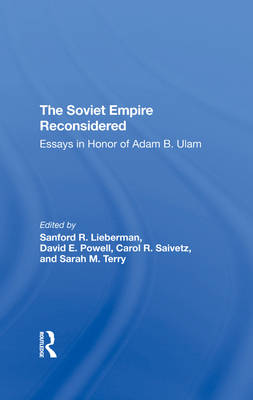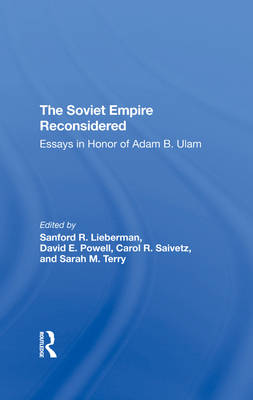
- Afhalen na 1 uur in een winkel met voorraad
- Gratis thuislevering in België vanaf € 30
- Ruim aanbod met 7 miljoen producten
- Afhalen na 1 uur in een winkel met voorraad
- Gratis thuislevering in België vanaf € 30
- Ruim aanbod met 7 miljoen producten
Zoeken
The Soviet Empire Reconsidered
Essays in Honor of Adam B. Ulam
Sanford R Lieberman, David E Powell, Carol R Saivetz, Sarah M Terry
Hardcover | Engels
€ 195,95
+ 391 punten
Uitvoering
Omschrijving
The demise of any empire provides an occasion for fresh examination of longaccepted "truths" about its history and its intrinsic nature: What set this particular empire apart from others? Why did it develop in the way that it did? Could events have taken a different path? What legacies has the empire left to its heirs? In this volume, eminent scholars reflect on the unique and central features of the Soviet empire during its period of consolidation in Europe and speculate on the long-term effects of its collapse. They reconsider subjects that have absorbed Adam Ulam's attention in his own work--the ideologies of central planning, of totalitarianism and state terror at home, and of intervention abroad--and explore their impact on the people who lived under Soviet power at its apogee. They also analyze the unraveling of the system on the domestic scene, in elite and grassroots politics, and in the international arena. Concluding chapters focus on the configuration of new domestic and foreign policies and on prospects for security and cooperation in the region.
Specificaties
Betrokkenen
- Auteur(s):
- Uitgeverij:
Inhoud
- Aantal bladzijden:
- 263
- Taal:
- Engels
Eigenschappen
- Productcode (EAN):
- 9780367295998
- Verschijningsdatum:
- 13/09/2019
- Uitvoering:
- Hardcover
- Formaat:
- Genaaid
- Afmetingen:
- 157 mm x 231 mm
- Gewicht:
- 544 g

Alleen bij Standaard Boekhandel
+ 391 punten op je klantenkaart van Standaard Boekhandel
Beoordelingen
We publiceren alleen reviews die voldoen aan de voorwaarden voor reviews. Bekijk onze voorwaarden voor reviews.











